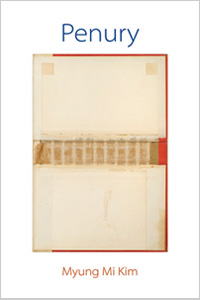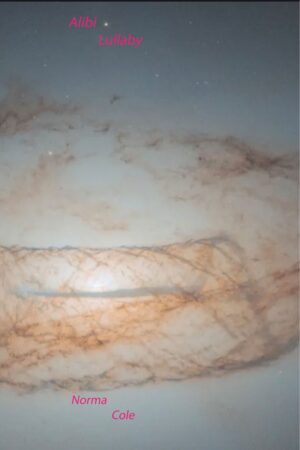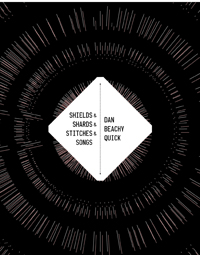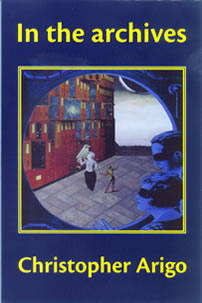Description
In Penury, Myung Mi Kim probes sanctioned norms of cognition by breaking communication into its most discrete components. With these irruptions and suspensions, she writes into extremes of forced loss, violence, and impoverishment. Exposing latent relations in sound and sense, Kim proposes how new ethical awareness can be encountered where the word and its meaning/s are formed. Here, language is not offered as transparent communication of ideas, but as testament to and disruption of oppressive dominant concepts and cultural practices. “Penury” means poverty, but in this text’s radical relation to lack, we hear the most elemental and active forms of change.
In Penury Myung Mi Kim has written a moving and disturbing testimony to losses incurred in a time of global war. Penury is a book of mourning that challenges the reader to listen, to imagine, to see in a world plastered with signs of excess and expenditure. Myung Mi Kim pares away language to its grammatical and phonemic core to create new rituals of assent and affect where an almost unimaginable promise of happiness surfaces. Penury is a brilliant accomplishment.
Michael Davidson
Myung Mi Kim’s poetry cuts through all the necrotized word-dressing on the body of English. She unearths possible tools, tools that are not fragments or remainders but “hand tools” that can quarry thoughts, memories, griefs, patiences across borders, deaths, and into new lands, where pronunciation is not obvious, and where “native speakers recognize native speakers,” blindsiding others. Here, syncopation’s light glows on every page; each poem-lattice forges new syntactic possibilities out of recombinatory signs, markings, letters, punctuation’s “markings.” These works are valour in the face of inadequation. “Such errant rapt/refraction” makes cognition possible in all our histories, for in confronting together the penuries in language, we learn to speak and dwell. “You start from scratch,” a voice in the poem echoes. And, in Myung Mi Kim’s Penury, “the scratch” is crucial, for it breaks a new surface, and language, emotion, inhabitation shine through.
Erin Moure
In Penury, a line of a poem is an action or the sense of a circumstance of some unknown individual experienced as if sensation or memory of one’s own action. There seem to be peoples, a nation. These actions are as if being (in) unfolding reality of history, rather than a synopsis of it that falsifies it. Her poetry is a filter, or the distance lens of binoculars, through which world is.
Leslie Scalapino
About the Author
Reviews
Excerpt
Myung Mi Kim is a Professor of English and a core faculty member of the Poetics Program at the State University of New York at Buffalo. Kim has also served as Distinguished Visiting Poet at St. Mary’s College, Moraga, California, and as Visiting Professor at Oberlin College. Kim was awarded The Multicultural Publisher’s Exchange Award of Merit for Under Flag (Kelsey Street Press, 1991). She also received a fellowship at the Djerassi Resident Artists Program, awards from the Fund for Poetry, a Daesan Foundation Translation Grant, and the State University of New York Chancellor’s Award for Excellence in Scholarship and Creative Activity. Myung Mi Kim is the author of Commons (University of California Press, 2002), DURA (Sun & Moon, 1999), The Bounty (Chax Press, 1996, 2000), and Under Flag (Kelsey Street Press, 1991, 1998, and 2008). The anthologies in which her work has appeared include American Poets in the 21st century: The New American Poetics, Moving Borders: Three Decades of Innovative Writing by Women, Premonitions: Kaya Anthology of New Asian North American Poetry, Making More Waves: New Writing by Asian American Women and other collections. And, Kim’s collaborations include “Spelt,” with the poet Susan Gevirtz. A collaboration with the poet, visual artist, and translator, Norma Cole, appeared in big bridge #12. The composer John Zorn commissioned her to write a bilingual Korean/English text which can be heard on Zorn’s “New Traditions in East Asian Bar Bands”. Most recently, she completed a commission from the Friends of the University Libraries, State University of New York at Buffalo, for their annual broadside.
Avant gardist Kim’s fifth book is a diligent inquiry into the relationship between language and power. The poems take place in a wasteland where war and, as the title would suggest, poverty are the norm; immigrants are treated with harsh suspicion and interrogated repeatedly, and Kim’s rage at injustice and suffering rings loudly: “[lookout post] / Are these your names/ From we are from where are you from/ Say this may speaking// To burn or expose to the threat of the sun a person with a pigeon chest and protruding stomach.”
Like Kim’s work in writing, our work in reading is on the way to elsewhere, our attentions are turned outward, onward. As movement, a reading tends toward the world, not just a text in the world. A text, a book, is not a fixed point in a trajectory, but a confluence, a meeting place. Instead of aligning with a tradition, Penury traces the stewardship of a concern. Rather than sit in reverence of a text, here to read is to prepare to attend to bodies in the world, even if they remain unsalvageable by that effort.
tw neither bird nor ornament
the calf stranded across the creek | that bellowing
the ragged ranges
as by
one’s ears
staum | stam
the makeshift shelter’s direct proportion of drinking water to raw sewage
asperline | tharp
: just a normal customer with no heavy accent at all
minimum human subsistence experiment
deemed not worthy of destroying . public order . kneeling
on the ground . hastily dug . ditches, syringes . hoarding .
withholding . designed to starve the whole region into submission
: the place I’m from is no longer on any map




